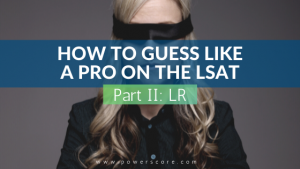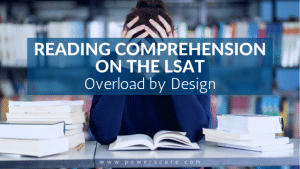As you know, there is no penalty for guessing on the LSAT. So, it goes without saying that you shouldn't leave any questions blank. If you are running out of time, make sure to guess on any unanswered question. Because some answer choices are more likely to occur than others, you should not guess randomly. Precisely how you guess, however, depends on how strong of a test-taker you are, and which questions you need to guess on. Let's … [Read more...]
Should I Study Formal Logic in College to Prep for the LSAT?
Given the emphasis on Logical Reasoning on the LSAT, students often wonder if they are missing out by not taking formal (or deductive) logic in college. Deductive Logic in Courses Granted, some exposure to deductive logic doesn't hurt. At their best, such courses will:Teach you the fundamental concepts of symbolic logic. Help you understand the difference between valid and invalid arguments. Train you to use symbolic language to … [Read more...]
The LSAT: Why Those 3 Sections?
When students begin their preparations for the LSAT, their questions generally concern how to go about maximizing their scores. Given the importance of the LSAT in their law school applications, this is completely understandable. But it can be worthwhile to understand the perspective of the test makers. Let's talk about why you're working so hard to break down the complexities of this test. Reading Comprehension Reading Comprehension is perhaps … [Read more...]
5 Steps to Approaching the Answer Choices in Logical Reasoning Questions
1: Determine Know what the question stem is asking you to do. Although there are a myriad ways to ask the same question, there are only 13 basic question types on the LSAT. Take a look at the following example—all the question stems listed below belong to the same type of LSAT Logical Reasoning question (Justify the Conclusion), requiring you to identify an answer choice that proves conclusion of the argument:Which one of the following, if … [Read more...]
Passage Diagramming and Notation on the Reading Comprehension Section
Diagramming and notation can play a vital role in a strong performance on the Reading Comprehension section of the LSAT. The ideal approach to effectively breaking down the passages, however, can be different for each student. Unlike Logic Games, when it comes to Reading Comprehension passages there is no single best way to diagram or notate. There are, however, several diagramming options from which to choose. Basic Underlining This is the … [Read more...]
What to Do When You’re Feeling Defeated by LSAT Prep
Our free to use LSAT Discussion Forum is a tremendous resource for any student gearing up to take the LSAT and apply to law school, and while I'm sure the majority of our blog readers frequent the Forum and participate, it's easy for helpful posts there to slip through the cracks. In an effort to help our readers here stay fully informed, we occasionally have highlights of common questions we encounter in the forum. Two things first:Go use … [Read more...]
Get a Grip on your LSAT Prep
It's fair to say that we generally think of friction as a negative thing. That's basically an accurate view in the context of personal and societal relationships. But, friction can also be very useful, even necessary, in other settings. For example, LSAT prep. We're going to go into how you can adapt the concept of friction to grain traction in your prep and accelerate past the plateau you may be on. How Friction it Works In case you need a … [Read more...]
Negating Conditional Statements
Most Logical Reasoning questions with conditional reasoning won’t require you to negate the conditional relationships in them. You will certainly need to know what the contrapositive is, and—if there are multiple conditional relationships—you need to know how to form a conclusion by combining them into a chain (aka the “law of syllogism”). Occasionally, in Justify questions, you will need to establish a logical link between the premises and the … [Read more...]
Reading Comprehension on the LSAT: Overload by Design
The LSAT's Reading Comprehension passages are typically dense and convoluted. Clearly, it's not lazy summer beach reading. But what is the reason behind the design? Reading vs. Reading Comprehension When we read a passage, we're performing several mental processes all at once. For example, as we read a sentence, we identify individual words and combine them into phrases and sentences. An experienced and skilled reader, such as a law school … [Read more...]
Need LSAT Advice? How to Help Us, Help You
One of the most common LSAT preparation questions we receive is: "I've been studying for a while and want to increase my score even more. Do you have any tips to help me out?" This is a question we love to get because it directly relates to what we do. We love the LSAT, and we are passionate about helping students get better at taking this test.When answering this question, one of our goals is to provide advice that is specific to the … [Read more...]
Attacking Logic Games: Focus on Certainty!
Understanding Global and Local question strategies in Logic Games is difficult. Dave's blog post on the subject got me thinking about recent conversations I've had with students on similar topics, primarily with respect to efficient inference making and question attack. So I'm going to supplement his insights with a few of my own. Positive and Negative Certainty We focus a tremendous amount of time and attention in our courses and books … [Read more...]
Bored with Reading Comprehension? Maybe That’s the Problem
Reading Comp may be your worst section. Students often admit boredom with it; "hate" is a commonly used word. Nobody cares about Navajo weaving techniques, 18th century French female poets, or the !Kung people. Why should you? Here's why: Low Interest Reading A number of research studies show that test-takers who report a high level of interest in the topic of a passage also demonstrate higher levels of engagement with the text. The presence of … [Read more...]
Global/Local Question Answering Strategies
A while back, I received an interesting question from a student: “Hi, I have your Logic Games Bible and have a question. Another book recommends answering local “if” questions first then doing what you call global questions. I don't believe the Bible makes any recommendations about which questions to answer first. Do you have a question ordering strategy or you simply recommend answering them in the order they appear on the test?” Strategies … [Read more...]
How to Guess Like a Pro on the LSAT Part I: Logic Games
There is no penalty for guessing on the LSAT. So, it should go without saying that you shouldn't leave any questions blank. Precisely how you guess, however, depends on a number of factors.Are you a strong test-taker? Can you at least narrow down your possible choices? Which questions do you need to guess on?Let's break it down. Blind Guessing According to our Guessing Strategy and Probability Tables, you would be best served by … [Read more...]














